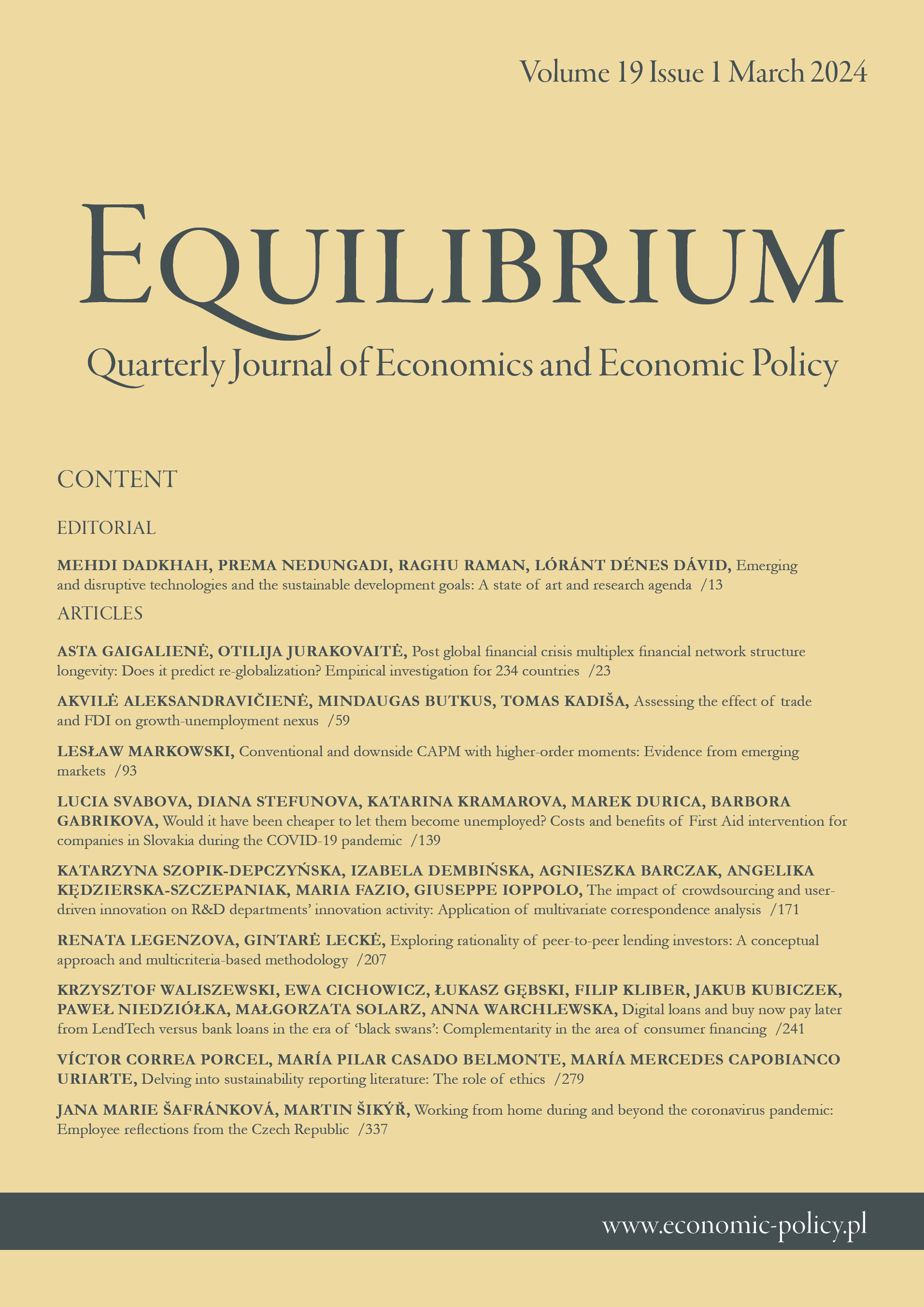国际财务报告准则创新、治理实践和公司绩效:海湾合作委员会地区调节效应的新实证评估
IF 6.2
Q1 ECONOMICS
Equilibrium-Quarterly Journal of Economics and Economic Policy
Pub Date : 2023-09-30
DOI:10.24136/eq.2023.020
引用次数: 0
摘要
研究背景:尽管已经进行了大量的研究,公司治理机制和公司绩效之间的关系仍然是一个有争议的问题,特别是随着世界各地会计设置的增长。本文目的:本研究评估了2016-2019年期间,国际财务报告准则(IFRS)对选定的海湾合作委员会(GCC)国家上市公司(即沙特阿拉伯、卡塔尔、巴林和阿拉伯联合酋长国)公司治理机制与公司绩效之间关系的调节作用。方法:重要的是,我们考察了皇室成员对公司长期绩效的直接和间接影响。我们试图用稳健的估计方法来回答我们的研究问题,如pooled OLS,固定效应,随机效应和一阶差分模型。的发现,结果显示,在合并样本中,公司规模和董事会规模对公司绩效有显著的正向影响,而财务杠杆对公司绩效有显著的负向影响。RFP对FP的影响被认为是负的和显著的,而相互作用项被发现是正的和统计显著的。这特别指的是,王室董事可能在影响执行管理团队充分作出反应,提供广泛的自愿披露和遵守国际财务报告准则方面发挥重要作用。我们的同步分位数回归分析显示了公司治理机制在不同阶段对公司绩效的影响。虽然我们注意到,国际财务报告准则的转型改善了信息的可比性,但海湾合作委员会国家的政策制定者应继续营造有利的环境,支持有助于实现经济多元化的创新商业实践。本文章由计算机程序翻译,如有差异,请以英文原文为准。
IFRS innovation, governance practices and firm performance: A new empirical assessment of moderating effects across GCC region
Research background: Despite the large volume of research which has been conducted, the association between corporate governance mechanisms and firm performance remains a controversial issue, particularly with the growth of accounting settings around the world. Purpose of the article: This study assesses the moderating role of International Financial Reporting Standards (IFRS) on the association between corporate governance mechanisms and firm performance in selected Gulf Cooperation Council (GCC) country-listed firms, namely Saudi Arabia, Qatar, Bahrain, and United Arab Emirates over the period 2016–2019. Methods: Importantly, we examine the direct and indirect influences of royal family members on long-term firm performance. We attempt to answer our research questions using robust estimation methods such as pooled OLS, fixed effect, random effect and first difference models. Findings & value added: The outcome reveals a significant and positive impact of firm size and board size on the firm performance in the pooled sample, while there is a significantly negative influence of financial leverage on firm performance. The impact of RFP on FP is seen to be negative and significant while the interaction term is found to be positive and statistically significant. This notably refers to the possibility that royal family directors could play an essential role in influencing the executive management team to fully react to provide extensive voluntary disclosure and comply with IFRS adoption. Our simultaneous quantile regression analysis displays the influence of corporate governance mechanisms on firm performance in various stages. While we observe that IFRS transformation has improved information comparability, policy makes in GCC countries should continue to foster conducive environment to support innovative business practices that help diversify their economies.
求助全文
通过发布文献求助,成功后即可免费获取论文全文。
去求助
来源期刊
CiteScore
9.20
自引率
3.50%
发文量
28
审稿时长
36 weeks
期刊介绍:
Equilibrium. Quarterly Journal of Economics and Economic Policy is a scientific journal dedicated to economics, which is the result of close cooperation between the Instytut Badań Gospodarczych/Institute of Economic Research (Poland) and Polish Economic Society and leading European universities. The journal constitutes a platform for exchange of views of the scientific community, as well as reflects the current status and trends of world science and economy.
The journal especially welcome empirical articles making use of quantitative methods in: Macroeconomics and Monetary Economics, International Economics, Financial Economics and Banking, Public Economics, Business Economics, Labor and Demographic Economics, Economic Development, and Technological Change, and Growth.
Current most preferable topics and special issues:
The economics of artificial intelligence: business potentials and risks;
Digitalization and entrepreneurship in economics;
Sustainable socio-economic development, environmental and ecological economics;
Transition in the energy market (improving energy efficiency, alternative energy sources, renewable energy, energy security).

 求助内容:
求助内容: 应助结果提醒方式:
应助结果提醒方式:


